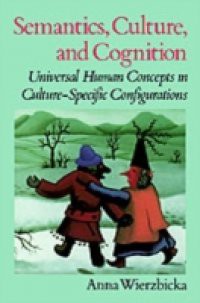Not everything that can be said in one language can be said in another. The lexicons of different languages seem to suggest different conceptual universes. Investigating cultures from a universal, language-independent perspective, this book rejects analytical tools derived from the English language and Anglo culture and proposes instead a "natural semantic metalanguage" formulated in English words but based on lexical universals. The outcome of two and a half decades of research, the metalanguage is made up of universal semantic primitives in terms of which all meanings--including the most culture-specific ones--can be described and compared in a precise and illuminating way. Integrating insights from linguistics, cultural anthropology, and cognitive psychology, and written in simple, non-technical language, Semantics, Culture, and Cognition is accessible not only to scholars and students, but also to the general reader interested in semantics and the relationship between language and culture.

